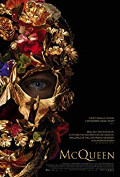
Directed by
Ian Bonhôte / Peter Ettedgui
111 minutes
Rated MA
Reviewed by
Bernard Hemingway

McQueen
Synopsis: The life and career of Lee Alexander McQueen from his start as a Saville Row tailor’s apprentice to lionization as a haute couture wunderkind and his untimely death.
You don’t need to be a fashion maven to be rewarded by this compelling documentary for there is mystery, glamour, passion and tragedy aplenty here.
The mystery is how a young working class man from London’s East End with no prior connection to the world of fashion, high or low, was endowed with a talent for designing and making fabulous frocks. The glamour, it goes without saying is the rarefied world of haute couture, the passion is that of same young man’s extraordinary dedication to realizing his vision, and the tragedy is how his remarkable success became the key to his own destruction.
Director Ian Bonhôte and writer and co-director Peter Ettedgui could have turned Lee McQueen’s story into a sensationalized account of a world that is so removed from most people’s day-to-day concerns as to be virtually incomprehensible (or, at best, parodied as in Ben Stiller’s Zoolander films). Instead they choose to largely accentuate the positive, giving us a chronological account of McQueen’s solid East End background, his co-incidental entrée into men’s tailoring and his meteoric rise in the world of London fashion before being head-hunted by Givenchy, and later Gucci, to head up their iconic labels.
It is a stimulating ride that by cherry-picking from his dazzliing shows amply demonstrates how McQueen transformed the displays of haute couture beloved by Vogue and Harper’s Bazaar into transgressive, darkly hallucinatory journeys into the designer’s psyche, more art installation/performance pieces than traditional strutting catwalk parades. Thus. in an extraordinary finale to one of his show a model in a huge pristine white gown rotating on a spinning platform becomes like a blank canvas for two robotic arms which spray her in Jackson Pollock-like jets of black and lemon-green, creating a remarkable image of ecstasy and defilement, a kind of sublimation it seems of McQueen own childhood experience of sexual abuse at the hands of an uncle (we have seen only recently in Whitney how psycholigically destructive child abuse can be).
With rape, murder and insanity as grist to his artistic imagination it is little surprise that as fame and fortune came his way and an enormous burden of expectations fell upon him that McQueen went off the rails not just with drugs and sex (he contracted HIV) but with dieting, liposuction and cosmetic surgery, a trajectory that turned a chubby, daggy but optimistic East End lad into a haunted shadow of his former self. albeit one attired in Comme Des Garçons.
Bonhôte and Ettedgui interweave highlights from McQueen’s shows with interviews with friends, family (including a cousin, Gary James McQueen, who, interestingly, has impressive draughtsman’s skills) and studio collaborators. The subject of McQueen’s gradual personal estrangement and his tragic end is treated with restraint. This includes the breakdown of his relationship with fashionista, Isabella Blow, an early champion of his work. As she died in 2007 (also by suicide) this is perhaps circumstantial but clearly her death impacted heavily on him. Some may find this part of the film a little too schematic but it is in essence such a common story that it is easy for us to fill in the gaps.
Michael Nyman’s score tends to be overbearing and Cinzia Baldessari’s editing is busy, a combination which perhaps chimes with McQueen’s penchant for sensory overload but it can be quite wearing on the big screen, particularly when combined with a goodly measure of hand-held archival footage. Quieter moments such as the interview with his older sister are somewhat of a relief in this respect.
Some more contextualization to the time that also gave us the Gallagher brothers and Britpop would have added depth bu McQueen is above all a story of genius burning-bright and that, for us mere mortals, is more than enough.

Want more about this film?


Want something different?




